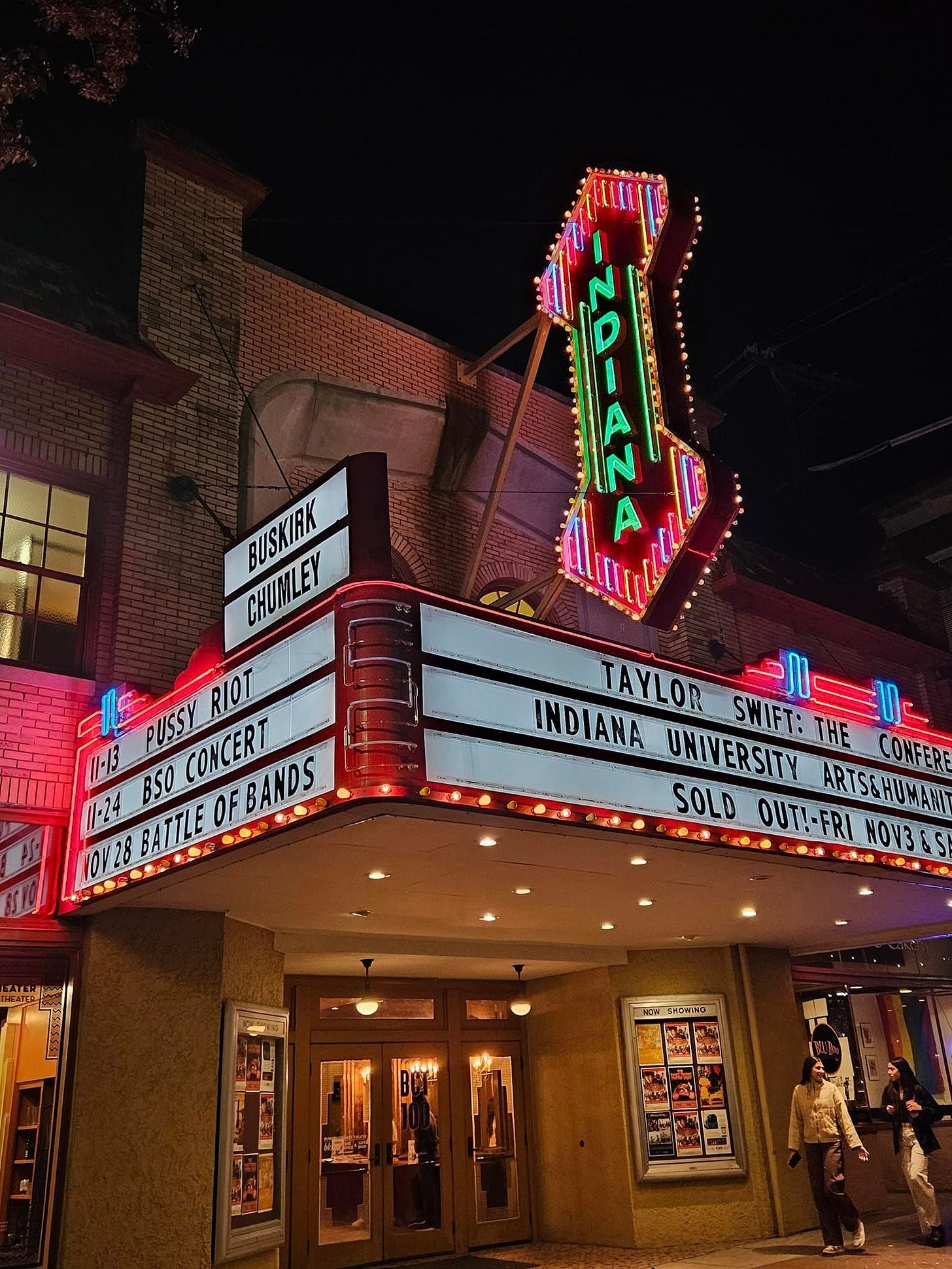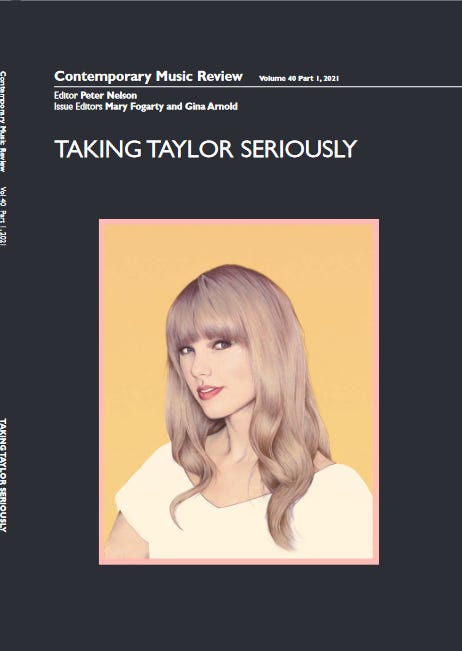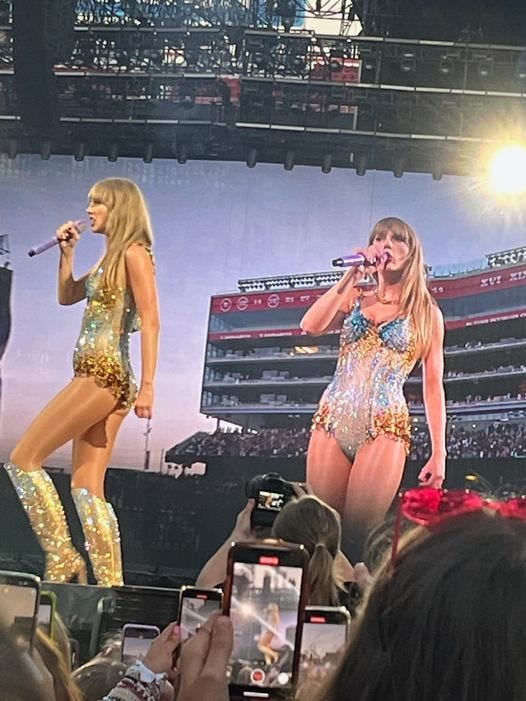What We Do In The Shadows
Taylor Swift: The Conference Era. Bloomington Indiana, Nov. 3 - 5 2023
A few months back I was asked to be a keynote speaker at an academic conference on Taylor Swift. It was funded by the Indiana University Arts and Humanities council, and the request befuddled me a little bit, because I am not a big fan of that artist. Also, it was in Indiana, and it was in November, two aspects that felt almost imaginary to me at the time. Practically the only thing I knew about Indiana was that the former vice prez comes from there. But the city the conference was in – Bloomington – was also the location of my favorite film of all time ever, “Breaking Away,” and that kind of canceled the first fact out.
Even so, I hesitated for a while to confirm, but not because I thought it was a silly theme for a conference. Most, if not all, academic conferences have fairly arbitrary themes upon which scholars can hang their interests: I once went to one for ASA whose theme was I kid you not, Misery. The point of a theme is just to open up a topic to every point of entry and since Taylor Swift touches clearly on race, class, labor practices, poetry, visual and performance theory, feminism and economics, why not?
Or so I thought but the conference’s title and subject got a lot of push back both from the media and from the academy - you know the whole, “ThIS Is WhAt AcAdeMia iS TeAcHiNg NoW? discourse, bla bla blah. One can only presume such comments came from ignoramuses who don’t understand the purpose of such gatherings. And while it is true that this conference included in its lineup a trivia contest, a karaoke night, Taylor Swift-themed donuts and drinks, and an interactive screening of the execrable film “Cats” at which we were given cat-ear headbands and drawn on whiskers and instructed to throw things and hiss at the screen, it was probably the most generative conference I have been to in years.
Actually, it was probably BECAUSE it had those things that it was so generative.
Ideally, an academic conference is a place where you go to air your own weird academic theories and come away with fresh ideas about your topic. And sometimes, though rarely, that happens. But this conference went one step farther. Because it was open to the public (and sold out!) it was more like what Habermas would call the commons of the public sphere. I thought, going in, that the room would be full of dotty Swifties but that was not the case at all; the speakers were mostly academics or journalists with expertise in all kinds of areas, and so I learned a ton about other stuff. Like there was one talk, titled “Genre is my Boyfriend,” by a musicologist, Kyle Adams, who broke down some of Taylor’s songs and production values to show how Jack Antonoff was applying various techniques based on songs from a variety of sources. Adams sang the songs himself, very poorly, with his 13 year old daughter backing him on guitar, and then showed via powerpoint the shifts in modality that created the work we know, and his talk has informed the way I will listen to all music now, not just hers.
Another talk, “Folk Feminism, from Joan Baez to Taylor Swift,” discussed the history of the female folk singer and how Taylor’s production of that concept both conforms to and deviates from that: the speaker, Addie Mahmassani, showed how Swift’s love songs don’t conform to classic folk music and posited that all her ‘eras’ are in fact the same. A third talk by dance scholar Dr. Mary Fogarty discussed how her videos converse with ideas of film scholar and queer theorists Richard Dyer; while the final keynote, by Leah Donnella, an NPR journalist with Code Switch (one of my favorite podcasts) touched on the unexamined aspects of white privilege that underpin Swift’s supposed “relatability.” It was called, ‘The Politics of Growing Up.”
That’s just a really small sample of stuff that was going on at the conference, and although I can’t guarantee it, I am pretty sure a lot of the young women who came for the chance to take selfies with Taylor cutouts, Red-theme donuts and drinks called Cruel Summer came away with a way more nuanced understanding of both Taylor Swift’s music and what we do in the shadows, i.e. the academy. In fact, I know they did, because I met one, a 21 year old named Megan, who arrived at trivia night with only her Dad for company, because, as she shyly told us, “I’ve been waiting my whole life to do this.” Thankfully, Megan was put on my team, and was easily able to answer questions like what 4 states are Taylor’s 13 homes in, what are the full names of her three cats, and what movies she’s written songs for – though even Megan, like all of us, fell down on the question, “Which seven Swift songs only reached #2 on the charts”? (We all agreed afterwards that this was a very male question: I bet men at Beatles conferences delight in stuff like that.)
Megan was obviously a super Swiftie, while as I said, most of the rest of us were kind of critical of Taylor: debates raged over beer and donuts whether she is or is not a feminist, or queer, or on the spectrum, and why she hasn’t used her power to be more political, and what might happen if she did. But when I asked Megan if she was enjoying the conference, despite the critiques, she said she absolutely loved it. And I get that, because even I was kind of starstruck, not by the subject, but by the way it was approached in this extremely safe, extremely friendly, and above all predominantly female space. From Leah Donnella aptly quoting a poem by Lucille Clifton:
“i am running into a new year
and i beg what i love and
i leave to forgive me –
…to Addie Mahmassani singing bits of Joan Baez a capella throughout her talk, the vibe at this conference was a hundred light years away from almost every scholarly gathering I have been to.
Suffice to say, at one point one of the keynoters (who shall remain nameless) got on stage on her hands and knees and imitated a sexy cat grooming itself; and, as previously mentioned, a speaker brought his daughter on stage to play the guitar. Even Megan’s Dad, dutifully accompanying his daughter to this grungy downtown bar so she wouldn’t feel awkward walking into it alone, was a welcome presence in our little silo.
My own talk was called the other side of money, and it used Guy Debord’s Society of the Spectacle to think through the ways that Swift’s Eras tour represents, like the spectacle itself, “The abstract equivalent of all commodities.” In it, I posited that one reason her music is thriving to such a frightening extent is because of the way it has managed to re-energize social capital, or what sociologist Robert Putnam once blamed for the collapse of the social fabric and the loss of civil engagement…a collapse which could certainly be seen in the dullard faces of the students in my rhetoric class as they nodded off to the idea that the success of the Eras tour (and the movie) indicates a craving for social connection via the recreation of social capital and weak community ties - those that would be forged, for example, between kids dancing in the seats at the local cineplex, or ones standing outside Levi’s Stadium watching Taylor for free in the parking lot of the San Jose convention center.
My overall point was that, although we are in the midst of the most relentlessly mass produced era ever, and even though Taylor Swift seems like that apex of that, Taylor Swift’s fandom seems to have performed some kind of magical shimmy that reverses the whole idea of a subculture. Typically, a subculture is a symbolic form of resistance to a dominant ideology that begins in places like basements and abandoned spaces, but Taylor Swift’s career started out as the very opposite of that. It has never been local, never been underground, never been unmediated, never been in opposition to mainstream culture, and never, not for a single instant, not been commodified. Her career, and brand, isn’t just an expression of late capitalism, it is peak late capitalism. And yet… the end result of it hasn’t been to lull consumers of it into compliance, it’s been to re-animate them. Unlike other artists, Swift’s oeuvre has moved from the stadium to the movie theater to dance parties to hate-watching “Cats” together, to this academic conference, and finally, back to the bando and the basement and the bedroom, where all kinds of stuff is going on in their heads…and then shooting back out into the real world, re-injected with their personal aura.
So, despite Debord’s very true observation that the spectacle is the other side of money, “The abstract equivalent of all commodities,” there may also be another side to the spectacle – the other other side of money. Because what I saw when I looked around me at Taylor Swift’s Eras tour and more importantly at this conference, wasn’t people who were consuming her product; it was people who were co-creating it. It was people who were finding a way not to live without capitalism, but to co-exist with it.
You might say, yeah, well but that’s true of all music, and I hope that is the case. It’s just that I don’t often see the same vibe around music fandom; often it seems like fans and even scholars are conforming to the canonical rules around how to honor and consume rock ‘n’ roll catholically - a method which includes making lists, comparing record collections, and dissing people who think differently then them. Meanwhile, by contrast, without being remotely alternative herself, Taylor Swift has somehow been the catalyst for creating an alternate universe, a safe space where you can air your girlie-ass theories without fear of ridicule or laughter. And for that, I am thankful.







And to expand on that, it’s because of her blandness she can dress like a cat without having any tension between her ordinary persona and the ears and whiskers. It’s like, OK, I’m a cat now. I particularly like your passage where you describe her as opposed to the classic underground musician.
Cats is one unfortunate movie, but she’s pretty good in it.